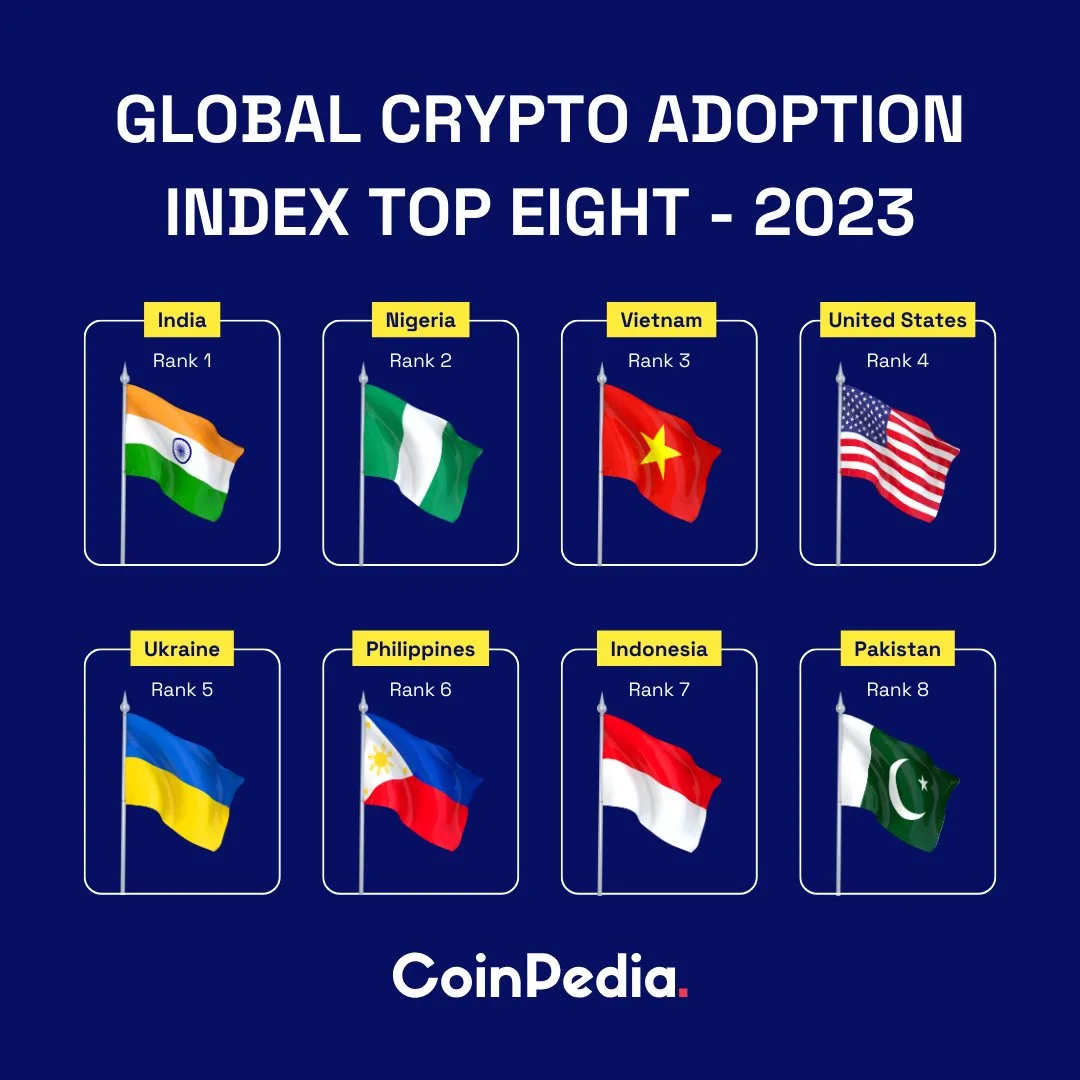Nigeria’s position as the second-most crypto-adopted country globally, trailing only India, is a testament to its dynamic blend of economic necessity, tech-savvy youth, and innovative peer-to-peer (P2P) trading ecosystems. According to Chainalysis’ 2024 Global Crypto Adoption Index, Nigeria’s high ranking reflects its unique ability to harness cryptocurrency as a tool for financial resilience, inclusion, and wealth creation amid economic turbulence. This article explores the drivers behind Nigeria’s crypto dominance, from Chainalysis data insights to grassroots P2P adoption and the youth-driven demand reshaping finance.
Chainalysis Data: Nigeria’s Crypto Adoption by the Numbers
Chainalysis’ methodology highlights Nigeria’s strength in grassroots crypto adoption, emphasizing how everyday citizens allocate significant portions of their wealth to digital assets. Key metrics include:
On-chain value received: Nigeria ranks 5th globally for cryptocurrency inflows at centralized exchanges, adjusted for purchasing power parity (PPP), signaling high relative engagement.
Retail dominance: Over 85% of crypto transfers in Nigeria are retail-sized (under $1 million), reflecting widespread individual participation rather than institutional dominance.
Stablecoin leadership: Stablecoins like USDT and USDC account for 43% of Sub-Saharan Africa’s crypto transactions, offering Nigerians a hedge against the naira’s 33% inflation rate in 2025.
These metrics underscore a society where crypto adoption is not speculative but pragmatic, driven by real-world needs like remittances, savings preservation, and access to global markets.
Grassroots P2P Trading
Nigeria’s P2P trading volume is unmatched globally, a response to restrictive banking policies and currency instability. When the Central Bank of Nigeria (CBN) banned banks from servicing crypto platforms in 2021, platforms like Binance P2P, Paxful, and Prestmit became lifelines for millions.
Why P2P Thrives in Nigeria:
1. Naira volatility: With the naira losing 52% of its value against the dollar since 2023, Nigerians use P2P platforms to convert savings into stablecoins or Bitcoin, circumventing currency controls.
2. Remittance efficiency: Over $48 billion in annual remittances flow into Sub-Saharan Africa, but traditional channels charge up to 10% fees. Crypto reduces costs to under 2% and speeds up cross-border transfers.
3. Financial exclusion: 66% of Nigerians lack bank accounts. Yet mobile penetration exceeds 80%, enabling seamless P2P adoption via apps like Moniepoint and Yellow Card.
For traders seeking secure platforms, Nigeria’s top crypto exchanges in 2025 offer regulated, Naira-friendly gateways.
Youth-Driven Demand: Crypto as a Path to Financial Freedom
Nigeria’s median age of 17.2 fuels its crypto adoption surge. Young Nigerians, disillusioned by unemployment and inflation, view blockchain as a gateway to economic empowerment:
Job creation: Blockchain development, NFT marketing, and DeFi protocols have emerged as lucrative careers. They offer AI-driven investment tools with platforms like ProsperaVest and Afriqvest.
Financial literacy: Social media influencers and crypto communities on WhatsApp and Telegram educate millions on strategies like passive income through DeFi and diversified portfolios.
Innovation hubs: Lagos and Abuja host blockchain startups like Zone and Bchain Africa. These events integrate crypto with traditional sectors like agriculture and identity management.
This tech-savvy demographic is not just adopting crypto. They’re redefining its utility, blending it with local needs like micro-loans and decentralized identity systems.
The Regulatory Evolution
Nigeria’s regulatory landscape has shifted from hostility to cautious embrace. Key milestones include:
SEC’s ISA 2025: Classifying crypto as securities, mandating licensing for exchanges, and introducing investor protections.
NIBSS blockchain integration: The Nigeria Inter-Bank Settlement System partnered with Zone to modernize payments, enhancing transparency and reducing fraud.
Crypto taxation: A 10% capital gains tax and mandatory reporting aim to formalize the sector while curbing scams like the $800M CBEX Ponzi scheme.
However, challenges persist. The SEC’s licensing delays and rising scams (e.g., romance frauds and fake influencers) demand vigilance. Investors should follow guides like avoiding crypto scams in 2025 to mitigate risks.
The Future of Crypto Adoption in Nigeria
Nigeria’s crypto journey is poised for growth, driven by:
1. DeFi expansion: Platforms like Yellow Card and Bitget Nigeria offer staking yields of up to 18%. Attracting users seeking alternatives to Nigerian Treasury Bills.
2. CBDCs and blockchain: The eNaira’s slow uptake highlights public skepticism, but hybrid solutions merging CBDCs with DeFi could bridge trust gaps.
3. Global partnerships: Fintech unicorns like Moniepoint ($1B valuation) and Flutterwave are integrating crypto into cross-border payments, aligning with wealth-building strategies.
Conclusion
Nigeria’s No. 2 ranking in crypto adoption is no accident. It’s a story of resilience, innovation, and youth-driven demand for financial inclusion. By leveraging P2P platforms, embracing stablecoins, and fostering regulatory clarity, Nigeria offers a model for emerging markets worldwide. As the SEC refines its policies and startups push boundaries, Nigeria’s crypto revolution is far from peaking, it’s just beginning.

Leave a Reply